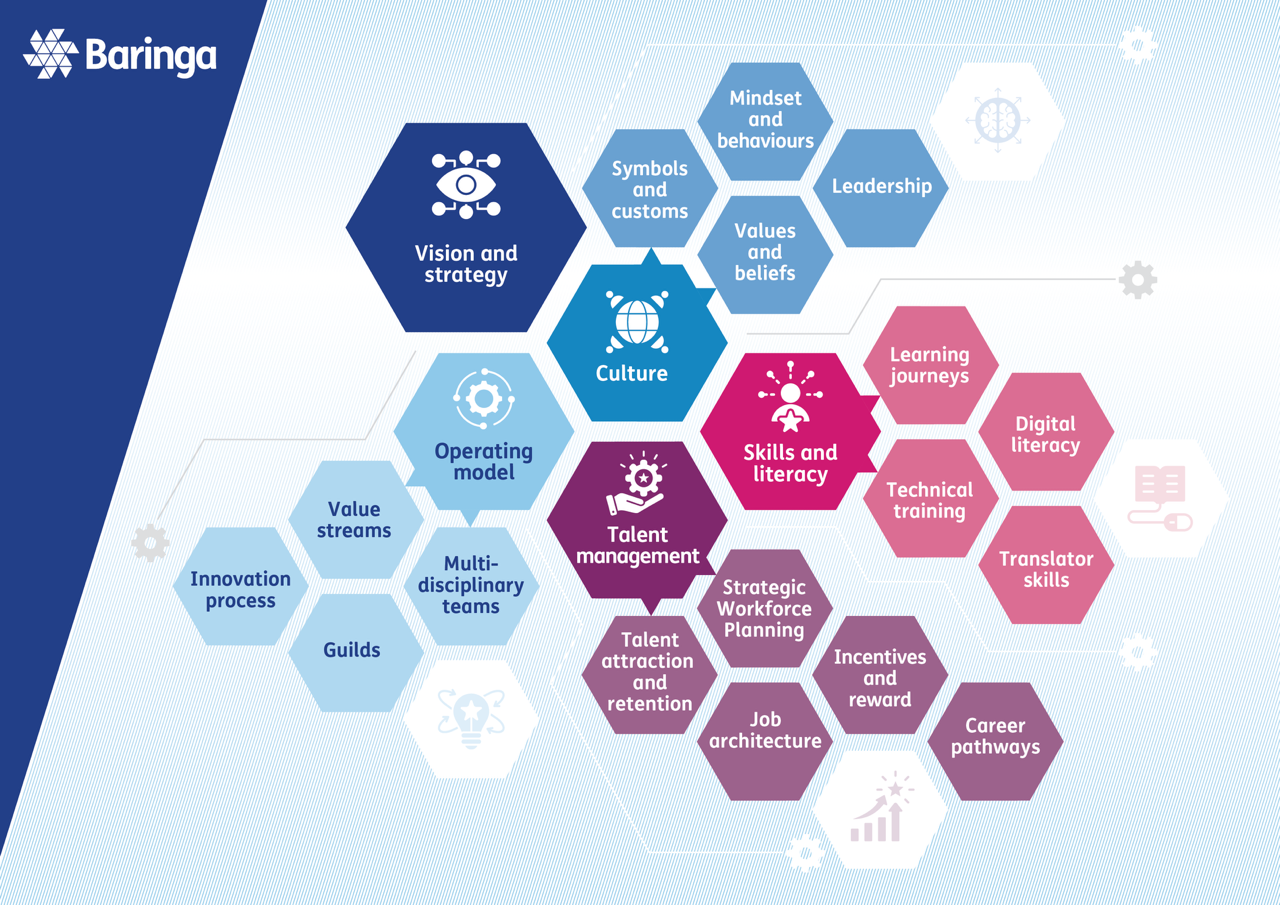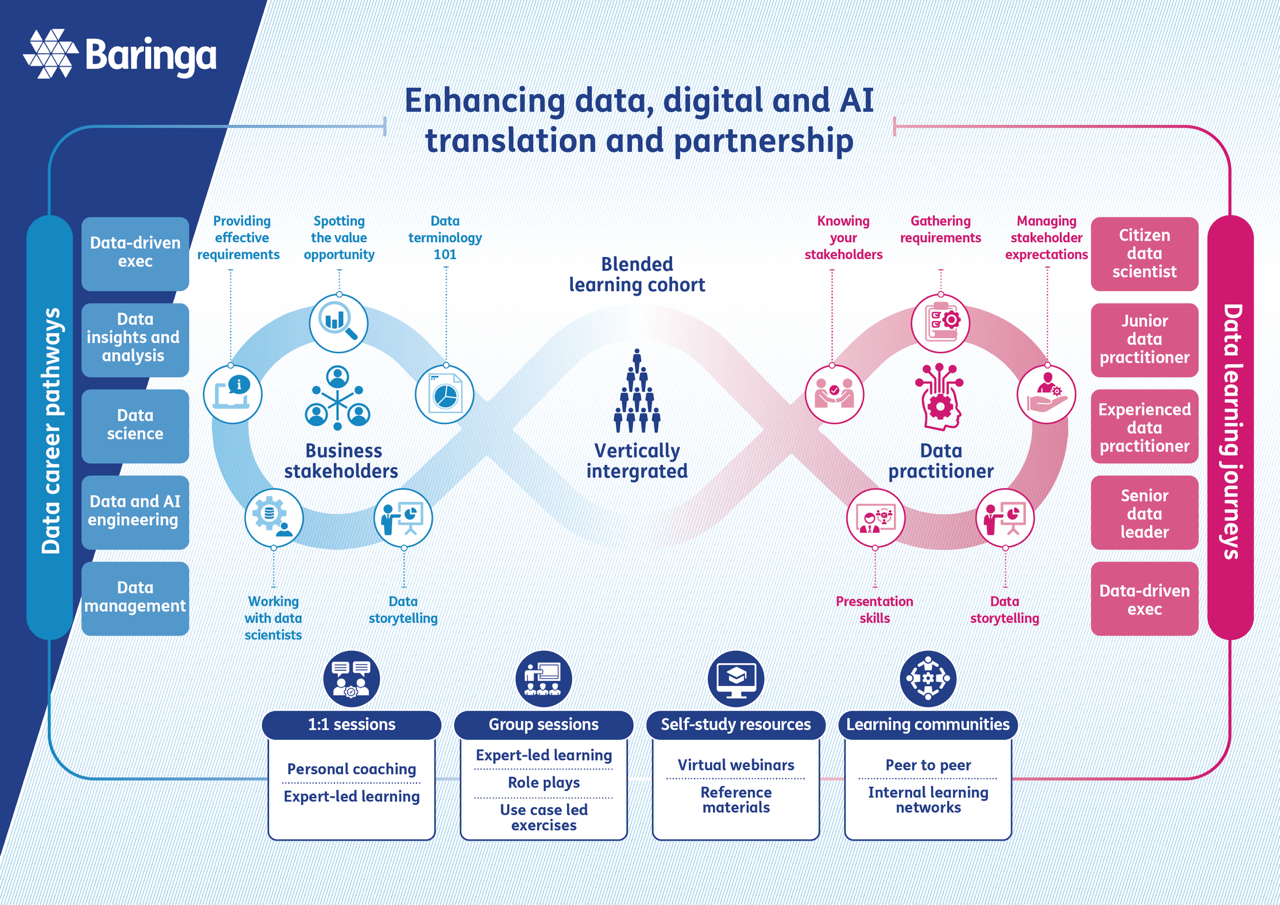
Laying the foundational human factors to enable data, digital and AI collaboration
5 September 2024
A global top 10 biopharma organisation recognised the need to lay foundational human factors to unlock the potential of data, digital and AI innovation, and co-operate effectively with their key internal and external collaborators in these domains.

Figure 1. Our view of the foundational human factors to enable Data, Digital & AI collaboration
We have supported this organisation with laying these foundations over the last two years, including defining modular learning pathways to cater for all levels of data, digital and AI capability across R&D and designing career pathways specifically suited to data science-related professions.
A key aspect of this delivery has been focussed on improving how ‘technical’ (eg data scientist) and ‘scientific’ (eg clinicians) stakeholders effectively communicate and collaborate with one another, both internally and externally. Overcoming this challenge is critical to support their bold ambition to embed and scale data, digital and AI innovation into all of their R&D programmes in the coming years.
Learn each others’ language, be curious about others’ perspectives, build powerful partnerships
We therefore developed an immersive and experiential learning curriculum for both technical and scientific audiences across R&D.
For ‘technical’ (eg data scientists) audiences, key topics included:
- Knowing the data scientist’s audiences to build an understanding of stakeholder preferences
- Gathering effective requirements to get a clear view of stakeholder needs
- Managing stakeholder expectations to effectively navigate changing requirements and emerging challenges
- Telling convincing stories to clearly communicate the outcome and value of data science.
For ‘scientific’ (eg clinician) audiences, key topics included:
- The core fundamentals of data science and where it adds value in their context
- Identifying data science opportunities and shaping requirements in their scientific domain
- The stages of a data science project and where scientific teams play an active role
- Interpreting, challenging and communicating data science output.

Figure 2. Overview of the key learning components
Over 400 R&D employees have completed this learning curriculum through a range of online and offline, interactive and self-study learning methods. Training champions across both technical and scientific communities were pivotal in supporting learning cohorts to translate learning into day to day action. Crucially, we have broken down the cultural barriers and stimulated true partnership between two diverse stakeholder groups who are fundamental to embedding and scaling data, digital and AI impact in R&D.
Find out more about our work supporting powerful pharma partnerships, our latest article on how powerful partnerships can unlock digital health innovation, or get in touch with our Josh Elliott to discuss how we can help you.
Related Client Stories

We talk to our client KCOM about modernising business operations
Join our TMT Director Sarah Roberts, as she talks to our client Tim Shaw, CEO at KCOM
Read more
Building a trusted data platform to enable scaling and cost savings
How do you accelerate delivery of a £multi-billion network expansion programme using advanced analytics and targeted insight?
Read more
Developing a Target State Operating Model for a technology and language services provider
Developing a comprehensive high-level target state operating model, defining the process architecture, and modelling the necessary capabilities for success.
Read more
Streamlining organisational structure to reduce complexity, scale, and grow
A new organisational resulted in a 10% cost efficiency across the organisation, as a result of simplification, standardisation, and the elimination of role duplication.
Read moreIs digital and AI delivering what your business needs?
Digital and AI can solve your toughest challenges and elevate your business performance. But success isn’t always straightforward. Where can you unlock opportunity? And what does it take to set the foundation for lasting success?